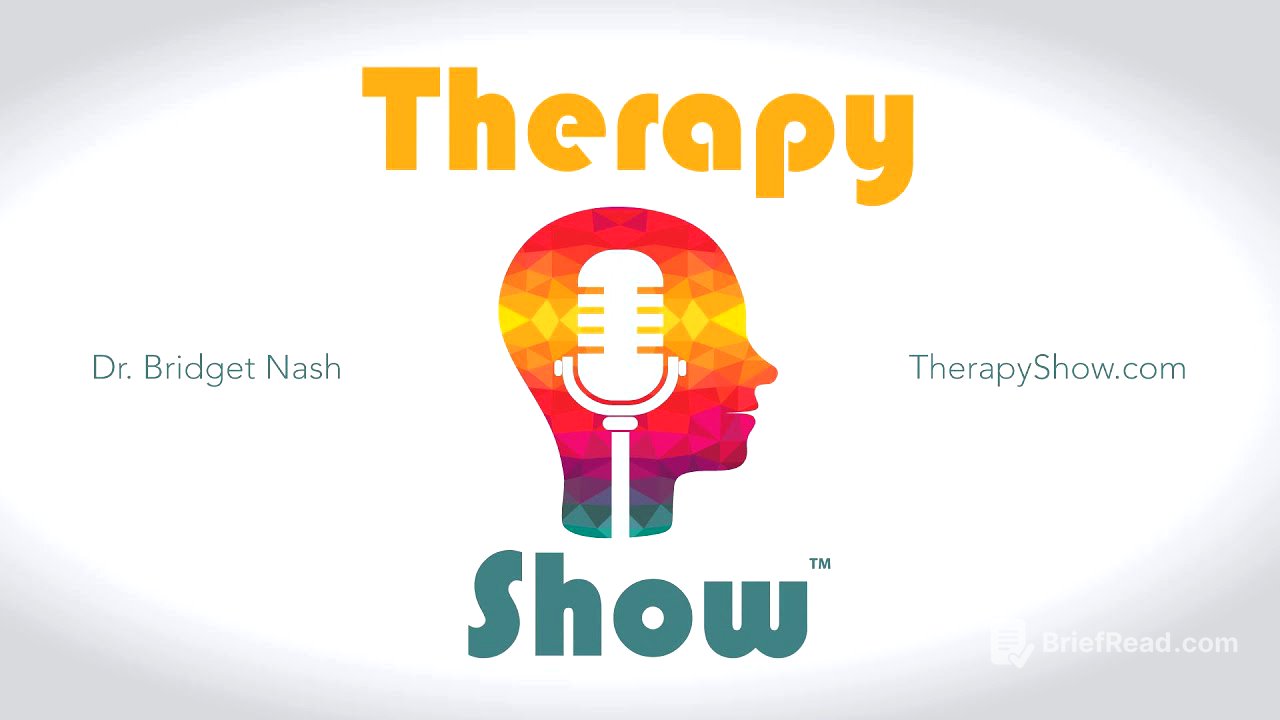TLDR;
This podcast features Dr. Judith Beck, president of the Beck Institute for Cognitive Behavior Therapy, discussing the principles, applications, and latest research in CBT. She explains CBT as a time-sensitive therapy focused on problem-solving and skill-building, emphasizing its effectiveness across various ages, settings, and conditions. Dr. Beck also touches on the importance of formal training for therapists, the collaborative nature of CBT, and the integration of recovery-oriented approaches to enhance hope, connection, and overall well-being.
- CBT is a short-term, skill-focused therapy.
- Research supports CBT's effectiveness for various conditions and populations.
- Formal training and supervision are crucial for competent CBT practice.
- Recovery-oriented CBT enhances hope, connection, and well-being.
- A sensible mental health system should triage patients to appropriate levels of care.
Introduction to Dr. Judith Beck and CBT [0:02]
Dr. Bridget Nash introduces Dr. Judith Beck, highlighting her extensive background in cognitive behavior therapy (CBT) and her role at the Beck Institute. Dr. Beck shares her early career in education, teaching children with learning disabilities, which helped her to break down complex concepts into practical terms. She defines CBT as a time-sensitive therapy that aims to solve immediate problems and equip individuals with lifelong skills, such as identifying and changing unhelpful thinking and behaviors to align with their values and goals.
Newest Research in CBT [4:01]
Dr. Beck discusses the explosion of research in CBT over the past 25 years, including neuroscience findings that show actual brain changes resulting from CBT. She also mentions research on CBT apps and online courses, which serve as effective treatment adjuncts. Additionally, she notes the application of CBT to medical conditions with psychological components, such as heart disease, HIV, post-surgery pain, and migraines, as well as its adaptation for serious mental health conditions like schizophrenia and bipolar disorder.
Effectiveness and Applications of CBT [5:29]
CBT is highly effective for a wide range of diagnoses, ages, developmental levels, and settings, including inpatient, outpatient, and residential treatment. Research supports its adaptability across various cultures and individuals with diverse learning styles. Dr. Beck suggests teaching basic CBT skills in schools to help children understand the connection between thoughts, emotions, and behaviors. She emphasizes the importance of questioning thoughts and learning the cognitive model, which posits that perceptions, rather than situations, directly impact feelings and actions.
Integrating CBT Skills in Education [7:37]
Dr. Beck advocates for teaching CBT skills in schools, citing research supporting CBT's use in group settings for children at risk of anxiety, depression, or anger issues. She underscores the value of teaching children that thoughts are not necessarily truths and introducing them to the cognitive model. This model explains that a person's perception of a situation, rather than the situation itself, influences their feelings and behaviors. She suggests teaching children to identify and evaluate thoughts that precede negative emotions, using questions adapted for younger ages to challenge unhelpful thinking.
The Importance of Formal CBT Training [12:31]
Dr. Beck stresses the importance of formal training for therapists using CBT, highlighting that continuous learning and supervision are essential for competence. She recommends reading, attending training programs, and participating in workshops, but emphasizes that there is no substitute for good supervision. Supervision at the Beck Institute involves reviewing recorded therapy sessions and receiving specific feedback, which is considered the best way to improve skills. She also encourages therapists to engage in lifelong learning to enhance their confidence and effectiveness in CBT.
Key Elements of a CBT Session [15:13]
Dr. Beck points out that many therapists claim to practice CBT but do not fully implement its key structural elements. She describes the standard structure of a CBT session, which includes setting an agenda, prioritizing topics, conducting a mood check, updating on important events, reviewing action plans, working on specific problems, summarizing key points, providing therapy notes, and asking for feedback. She likens incomplete CBT delivery to taking only half the necessary medication, emphasizing the importance of delivering CBT in the most effective way possible, informed by current research.
Treatment Length and Client Skills in CBT [18:10]
The length of CBT treatment varies, from a few sessions for specific problems to long-term contact for serious mental health conditions. For straightforward cases of depression or anxiety, treatment typically lasts between 6 and 20 sessions. Dr. Beck emphasizes the importance of clients keeping notebooks to record key points from sessions, as research shows people forget a significant portion of what they hear. She also highlights the value of making small changes in thinking and behavior daily and using techniques like identifying and evaluating thoughts to promote more productive thinking.
Collaborative Approach and Therapy Duration [24:07]
CBT is highly collaborative, involving shared decision-making between the therapist and client regarding session topics, time allocation, meeting frequency, therapy duration, and between-session activities. The therapist may provide an estimated therapy duration based on similar cases, but this is not always possible. Dr. Beck describes how to determine when a client is ready to end therapy, looking for signs of improvement, skill utilization, and action plan adherence. She recommends tapering off therapy and scheduling booster sessions to ensure continued progress.
Obstacles to CBT Effectiveness [26:21]
Common obstacles preventing patients from fully benefiting from CBT include financial constraints, poorly trained therapists, and negative beliefs about therapy. Dr. Beck contrasts the mental health care system in the UK, where patients are triaged to different levels of care based on symptom severity, with the US system, where less experienced therapists often treat the most difficult cases. She also notes that clients' negative beliefs about themselves, others, and the future can hinder progress, emphasizing the importance of therapists uncovering and addressing these beliefs.
Adapting CBT and Addressing Session Distress [29:57]
Dr. Beck emphasizes the importance of adapting CBT to each individual's unique characteristics, symptoms, aspirations, values, and background. She clarifies that competent CBT should not make patients feel worse at the end of a session. If a session becomes too distressing, she advises therapists to change the subject to something less upsetting, ensuring the patient leaves feeling better. This problem can then be addressed at the beginning of the next session.
Success Stories and Inappropriate Cases for CBT [32:18]
Dr. Beck shares a success story of a patient who had been severely depressed for six years and, after about 12 CBT sessions, was able to return to work, reconnect with others, and significantly improve her life. She notes that CBT is not known to be ineffective for any specific population, emphasizing that treatment must be tailored to the individual and delivered competently. CBT has been shown to be effective for a wide variety of psychiatric disorders, psychological problems, and medical conditions with psychological components.
Recovery-Oriented Cognitive Therapy [35:54]
Dr. Beck expresses her excitement about recovery-oriented cognitive therapy, an adaptation of CBT developed by her father, Dr. Aaron Beck, for individuals with serious mental health conditions. This approach focuses on strengthening people's sense of connection, hope, and purpose, empowering them, and increasing their well-being and competence. It involves identifying patients' aspirations and values at the beginning of treatment and framing session goals in alignment with these values. The therapist helps patients identify and address practical problems, unhelpful thinking, and skill deficits that hinder their progress.
Integrating Positive Experiences and Mindfulness in CBT [40:16]
Dr. Beck highlights the importance of dwelling on positive experiences during sessions, helping patients draw positive conclusions about themselves, others, and the future. She has shifted her treatment approach to integrate mindfulness and address negative thought processes more effectively. She advises people to keep track of positive moments every day, especially during challenging times like the COVID-19 era, and to share these moments with others to strengthen connections.
Improving Mental Health Treatment [44:31]
If she could improve one thing about mental health treatment, Dr. Beck would implement a more sensible delivery system with a triage approach, ensuring that people with the most serious problems receive care from the most well-trained therapists. She advocates for more equitable mental health care systems, leveraging technology to assist those with milder problems.
Resources and Closing Remarks [45:26]
Dr. Beck directs listeners to the Beck Institute website (beckinstitute.org) for resources, training programs, certification information, blogs, videos, and social media presence. She also recommends her book, "CBT Basics and Beyond," which incorporates a recovery orientation. Dr. Nash thanks Dr. Beck for her contributions to mental health treatment, and Dr. Beck expresses her enjoyment of the conversation. Dr. Nash encourages listeners to subscribe, share, and review the podcast and directs them to therapyshow.com for more mental health resources.









